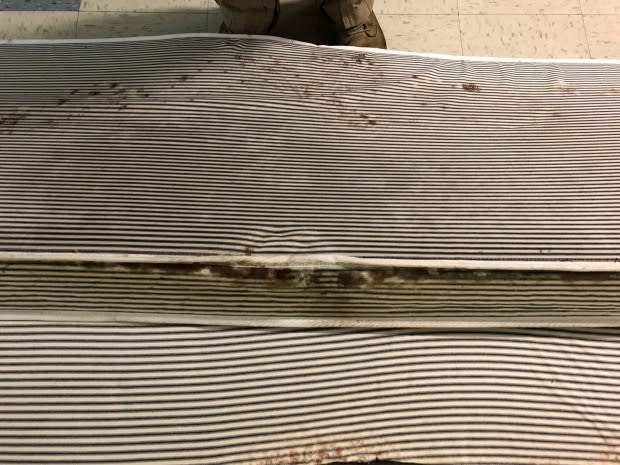Serving military member sues DND over mould exposure on warship

A serving member of the Canadian military has launched a proposed class-action lawsuit against the Department of National Defence after his flying career was cut short because of health issues which he claims are related to mould exposure aboard a navy frigate.
Capt. Felix Dunn, of Bedford, N.S., served aboard HMCS Vancouver for six months in 2016 when he developed a fever, chills and respiratory issues, and according to his doctors has never fully recovered.
The warship has had documented issues involving black mould, which environmental experts say is a serious health risk for people with pre-existing conditions.
Dunn is currently posted to the air force base in nearby Shearwater in an administrative position until he is due to be medically released from the military in March 2023.
It is the second time the federal government has been taken to court over the effects of mould exposure aboard warships.
A CBC News investigation first documented the problem in 2016.

As a result, the navy undertook an extensive series of air quality tests and engineering upgrades to the frigates to eliminate the excess humidity and poor air circulation that gives rise to mould.
At the same time, CBC News documented cases of sailors who said their debilitating respiratory health issues were a result of mould exposure, and one of them, former lieutenant Alan Doucette launched a lawsuit over the sometimes grimy conditions aboard the warships.
The case was eventually dismissed.
But since then, the Department of National Defence has compiled extensive documentation, which Dunn, in his statement of claim filed in Federal Court on July 29, said indicates the military covered up "the issue of mould growth and the compromised air quality it caused" and that it "failed to take appropriate action to ensure the health and wellness of the service men and women under its employ."
Somewhat more significantly, the lawsuit claims the defence department "was fully aware of the significant negative health effects that result from exposure to such mould, particularly repeated exposure over a long period of time."
None of the claims has been proven in court.

The lawsuit was filed on behalf of all serving and retired members of the Canadian Armed Forces who may have been exposed to black mould while serving at sea since Jan. 1, 2000.
As of last fall, environmental health assessment teams had examined four of the navy's 12 frigates — HMCS Winnipeg, HMCS Charlottetown, HMCS Calgary and HMCS Halifax — and found mould growth in specific areas related to air conditioning and ventilation systems, as well as and other confined spaces where food is stored.
Black mould was found on the mattresses of some bunks aboard HMCS Charlottetown, which the defence department initially denied before being confronted with photos leaked to CBC News last fall.
"These members were continuously kept in the dark and misled as to the conditions aboard the Canadian Navy ship on which they served," said Dunn's lawyer, Brian Murphy in a written statement, who added the defence department's reaction has shown "a wanton disregard" for the sailors and aircrew who've served.
An engineering analysis, obtained and published by CBC News in May 2018, blamed the mould problem on a lack of maintenance and upkeep by the navy.
The report, written in 2015 by an outside contractor, said the shipboard heating and air conditioning system (HVAC) had "significantly degraded" and that "little maintenance has been performed and the state of the equipment is old and unsupportable."
At the time, the navy's director general of maritime equipment, Commodore Simon Page, pushed back at the suggestion lax maintenance was to blame.

The navy initially started out when the first story was written in 2016 by denying there was a problem though it has slowly backed up as reports piled up.
But throughout it has insisted mould did not present a health risk and no direct complaints had been received from crewmembers or aircrew.
A spokesman for the defence department, Dan Lebouthillier, said "given the ongoing litigation, it would be inappropriate for us to comment on this matter."
The navy has said in the past that it is doing everything within its power to mitigate the mould, including updating the ventilation system controls and even buying portable dehumidifiers for various parts of the ship that seem most prone.
"Our sailors will know my message is — as it has always been — their welfare is our No. 1 priority and we encouragement to be an active participant in making the workplace safe and healthy," said Vice-Admiral Art McDonald, speaking to CBC News in December 2019.
McDonald answered questions about the ongoing concerns in the year-end interview and spoke directly to sailors and helicopter crews, saying: "If you see something that needs addressing, raise it to your chain of command and we'll work with you to address it."


